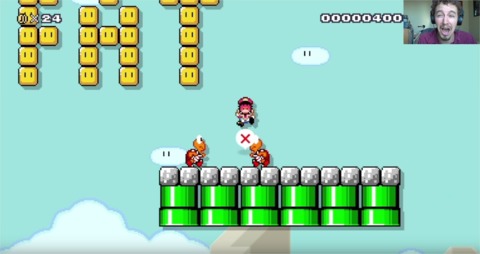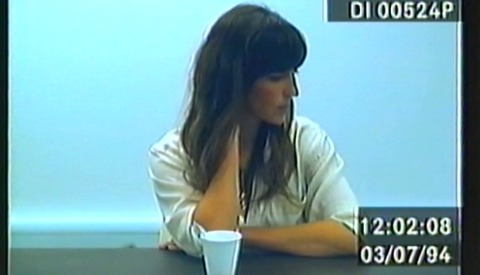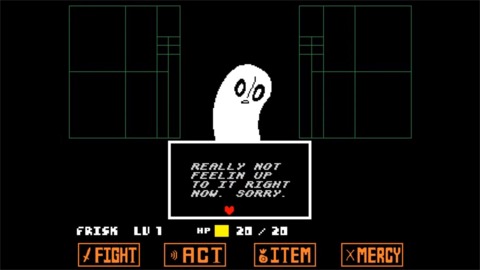
Alex van Chestein is a writer and designer at Quebec City's Frima Studio, the team behind last year's delightfully cooperative Chariot. You may also recognize her from the Giant Bomb community as HavocHQ, the brains behind the Giant ROM game jam. Be sure to check out her itch.io page, and follow her on Twitter.
Hey hi hello! I hope you’ve had a wonderful 12 months, because what a long, strange year it’s been. If someone had described to me in January the person I would become by December, I don’t think I would have believed them.
My resolution for 2015 was to silence the voice inside me that says something I want is too difficult to achieve. It led me to accomplish many things: go to a convention on my own, cosplay, travel more, draw every day for a month, stream a game for 24 hours, organize two game jams, make four games by myself, and redefine my entire identity. I honestly surprised myself with how far I went.
So, in the spirit of going further, here are ten games that came out this year and went above and beyond, be it emotionally (because I’m a big pile of feelings), mechanically (because I’m a game designer) or narratively (because I can’t stop writing about cute girls).
Hope you enjoy! Let’s make 2016 even more wonderful. <3
10. Cibele

I love Cibele because it manages to combine a set of completely different interfaces into a cohesive experience that I once knew very well: the social experience of playing an MMO. The accessible game underneath it all demands just enough attention to steer your character towards the next goal, but leaves you free to multitask and chat with friends, check your inbox, and carry on a conversation with an in-game partner.
What stands out, however, is that the game within a game is wrapped in a very personal story, one that’s difficult not to identify with. Playing Cibele was like reliving a past version of me, watching as the same mistakes were made, utterly helpless to stop any of it from happening--because it had already happened. Like the relationship depicted in the game, Cibele is a brief, but important, experience.
9. Attack the Light
I adore Steven Universe (the show); I’m a sucker for any story with a pacifist protagonist who just wants to hug folks and solve everything with kindness. The fact that the show has so many lovable characters, none of which fit a standard mold, makes it that much better.
Attack the Light, a sweet and smartly-designed turn-based RPG for smartphones, feels like it loves the property it’s based on as much as I do. I’ve seen my share of tie-in games (and worked on a few myself), but this one stands out thanks to its enthusiasm. It dives into the series’ material head-first, pulls out as many references as it can, and ties everything together into a neat story that feels at home in Steven’s universe. Everything is happy and genuine, and that’s so heartwarming to see.
8. Sentris
Sentris is a game that I appreciate primarily because of its hidden purpose. A puzzle game at first blush, the game’s cleverness lies in how it turns the player into a musician, unwittingly if need be. It’s easy (and common) for folks to say “oh, I can’t make music,” but Sentris has you create songs almost accidentally as you complete puzzles using instrument samples. And since the resulting song loops are yours to use anywhere else, it gives an added incentive to keep stretching those musical muscles.
I dabbled in music years ago but never got very far. Now, I never worry about music for my games; I have a growing pile of Sentris loops I put aside, each one delightfully unique in tone, that I can dig into any time I need. Any game that makes creators out of its players will get endless respect from me.
7. Super Mario Maker

...Which is why I think Super Mario Maker deserves recognition for encouraging so many folks, young and old, to become level designers. Even if you never touch the editor and just play community levels, you’re being exposed to the work of creators of various skill levels; you’re seeing where some go wrong and learning design principles. The players who do create levels learn more practical applications of design, but everyone comes out of the experience knowing a little more, and that’s fantastic.
I got into the industry partially thanks to the levels I made in Halo 3’s Forge mode; I have no doubt that making good Super Mario Maker levels will help some folks get a foot in the door as well. Perhaps it’ll even inspire some to follow a career path they never would’ve considered otherwise!
I also want to draw attention to the aesthetics of the game; Super Mario Maker has managed to make old games look as good as I remember them. There’s an extra layer of polish on both the visuals and the gameplay of the old titles, and it matches up perfectly with how good I think the originals looked. The developers managed to emulate not only the first few Super Mario games, but my nostalgia filter as well, and they deserve a medal for it.
6. Read Only Memories
ROM feels like a game outside of time. It uses a very low pixel resolution, but with high color depth; its aesthetics are reminiscent of childhood cartoons, but its narrative is smart and modern; it’s set in a decidedly 80’s cyberpunk universe, but its world has a level of diversity I’ve never seen in any game. I felt at home in ROM’s Neo-San Francisco; though its near-future is certainly not without its faults and perils, I would happily live in it.
An adventure game at heart, ROM starts out slow but picks up the pace at a surprising clip past the halfway mark. At first, it’s a lighthearted romp through a technologically advanced city, full of fascinating sights and eye-opening conversations with a little robot learning about the world and themselves. But when the story gets real, suddenly you’re taken to task on your words and promises, and you need to back up your talk with some walk. It’s a light bait-and-switch I’ve grown to love; a game lets you believe it’s one kind of experience, then reveals it’s not quite what you imagined. There are ways to prepare for the dangers in store, and the game smartly hides them in plain sight--you just need to be observant and explore the world you’re in.
As someone who rarely sees herself in games, being asked how I wanted to be addressed (in a completely story-appropriate way), and seeing meaningful diversity among characters with agency, made me feel welcome in a way I rarely get to experience. It may feel like a small detail to a lot of folks, but it meant a lot to me.
5. We Know the Devil

This short, poignant visual novel with a chillingly appropriate soundtrack charmed me instantly. It’s a story about acceptance and the lack thereof; a tale of camaraderie and uneasy self-discovery in a world that openly hates you and doesn’t hesitate to put you in danger. It’s a game about Venus, Jupiter and Neptune, three youths in an unenviable situation; all you can do as a player is determine who gets pushed out of the group. If you’re anything like me, you get to relive your childhood of being ostracised, then become the ostracising force.
To give a little background, I was bullied constantly as a child and had very few friends throughout primary and secondary school. Only later did I start being social and feeling like I could belong, if only in a limited way.
When I first played We Know the Devil, I left one character out because I identified more with the others. I saw an ending, and that was that. Months later, I returned and played through the game again multiple times, finally discovering the other possibilities--along with the slightly hidden true ending. That’s when I learned that I had rejected the character most like me. I had become every clique and every bully who made my life a living hell; I had pushed someone away because they didn’t look like they belonged. I had become everything I ever feared.
I really hope I learn from this. I have to.
4. Her Story
As a designer, I can’t overstate how excited this game made me. Your only meaningful game mechanic is using an underpowered search engine to watch videos. The rest takes place in your head; you decide how to interpret the information, you decide which vocabulary paths to explore… you even decide when you’re done!

As much as I appreciate complex interconnected systems, I find this sheer simplicity beautiful. The story told within those videos is fascinating, and I have to admire how the clips were laid out so as to lead players on a wild goose chase, word after word, hiding the more revealing clips behind a stubborn limitation of the search result window.
Her Story is a tour-de-force of novel concepts explored and refined into a haunting, distilled experience. And even when you’re satisfied, there’s still a lingering feeling of uncertainty; the game is designed to make you talk about it.
3. The Beginner’s Guide
I could write entirely too many words about the effect The Beginner’s Guide had on me; in fact, I already have. But it’s still not enough. Strange that a guided tour through another person’s games would have such a profound impact, but the relationship between the narrator and the developer… You know, you should really play this game if you haven’t already. I’ll wait.
Okay, good.
For anyone familiar with creative pursuits and the validation thereof, playing The Beginner’s Guide can open up old wounds. For me, they were still fresh; there had been no time to heal yet. I had just lived through a similar, painful relationship with someone important in my life, and this game brought everything back up to the surface before I could process any of it. It’s quite an experience, being put face to face with your own failings--ever so well-intended they may have been--and having to confront once again the person you’re desperately trying not to be anymore.
In a year full of feelings more intense than they had ever been before, this game left its mark on me.
2. Nuclear Throne

Thank goodness for Nuclear Throne. No matter how I feel, no matter how low the lows, all I need to do is press play and the rest of the world disappears. This game demands your full attention, because every split second counts. It’s a master class in signs and feedback; from Vlambeer’s trademark screenshake down to the subtle shifts in an enemy’s pose before an attack. It’s fast. It’s frenetic. It’s the cure for anything that ails you.
There is no time for feelings when playing Nuclear Throne; you are thrown into battle from the get-go and things only get faster. With procedurally-generated levels that keep things fresh and unforgiving bosses that demand adaptation, the game always gives a unique experience. It’s marvelously constructed, full of secrets, and wonderfully diverse.
It turns out that it’s not hard to make an inclusive game, even one about killing everything in sight to sit on a throne. I quickly found a character I identified with--the commanding Rebel, who makes small sacrifices so her friends can join her--and that led to my first-ever cosplay. It was a wonderful experience, albeit an unseasonably warm one.
1. Undertale
Undertale made me cry for hours.
I waited a while before I finally played this game; I had heard very little about it aside from the fact that many people were talking about it. It’s a game that gradually presents what it’s about--both in story and gameplay--and lets you draw your own conclusions. In fact, it expects you to assume certain things, and will react accordingly.
And when it chooses to surprise you, all bets are off. The designer in me squealed with delight every single time the game mechanics decided to throw a curveball. Even narratively, the game goes to places you’re not likely to expect. I have to say, though, that the way you play may dramatically affect the kind of experience you get.

Being all about hugs and love (for the most part), what attracted me to Undertale was the promise of its pacifist run. The idea that a seemingly “classic” turn-based RPG could be beaten without hurting anyone instantly appealed to me. And overall, it’s a refreshing way to play a game of this genre! It goes from a game about killing monsters to a game about getting to understand everyone who crosses your path, and trying to work things out. Boss battles become drawn-out conversations where you patiently duck and weave as conflicts are resolved. Sometimes talking doesn’t solve everything; sometimes you have to be creative. Sometimes, when it seems like there’s no other way but to fight, all you can hold onto is hope. And hope can be a powerful thing.
Undertale is a labor of love, a narrative experience full of characters that are so clearly loved by their creator that you can’t help but open up your heart to them too. It’s a musical tour-de-force, with its soundtrack never failing to bring up feelings felt when the songs were first heard. It’s a game that, at least for one possible path, matches my core principles completely. Because in the end… No matter how difficult it is, no matter how much it hurts me, I will find a way to help you.
I will find a way to save you. <3